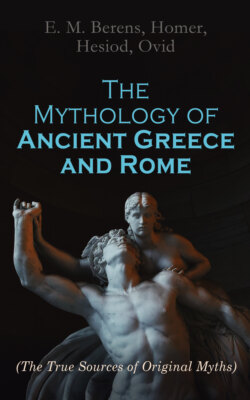Читать книгу The Mythology of Ancient Greece and Rome - Homer - Страница 101
На сайте Литреса книга снята с продажи.
FABLE XII.
ОглавлениеMercury, falling in love with Herse, the daughter of Cecrops, endeavors to engage Aglauros in his interest, and by her means, to obtain access to her sister. She refuses to assist him, unless he promises to present her with a large sum of money.
Hence, the bearer of the caduceus raised himself upon equal wings; and as he flew, he looked down upon the fields of Munychia,83 and the land pleasing to Minerva, and the groves of the well-planted Lycæus. On that day, by chance, the chaste virgins were, in their purity, carrying the sacred offerings in baskets crowned with flowers, upon their heads to the joyful citadel of Pallas. The winged God beholds them returning thence; and he does not shape his course directly forward, but wheels round in the same circle. As that bird swiftest in speed, the kite, on espying the entrails, while he is afraid, and the priests stand in numbers around the sacrifice, wings his flight in circles, and yet ventures not to go far away, and greedily hovers around the object of his hopes with waving wings, so does the active Cyllenian God bend his course over the Actæan towers, and circles round in the same air. As much as Lucifer shines more brightly than the other stars, and as much as the golden Phœbe shines more brightly than thee, O Lucifer, so much superior was Herse, as she went, to all the other virgins, and was the ornament of the solemnity and of her companions. The son of Jupiter was astonished at her beauty; and as he hung in the air, he burned no otherwise than as when the Balearic84 sling throws forth the plummet of lead; it flies and becomes red hot in its course, and finds beneath the clouds the fires which it had not before.
He alters his course, and, having left heaven, goes a different way; nor does he disguise himself; so great is his confidence in his beauty. This, though it is every way complete, still he improves by care, and smooths his hair and adjusts his mantle,85 that it may hang properly, so that the fringe and all the gold may be seen; and minds that his long smooth wand, with which he induces and drives away sleep, is in his right hand, and that his wings86 shine upon his beauteous feet.
A private part of the house had three bed-chambers, adorned with ivory and with tortoiseshell, of which thou, Pandrosos, hadst the right-hand one, Aglauros the left-hand, and Herse had the one in the middle. She that occupied the left-hand one was the first to remark Mercury approaching, and she ventured to ask the name of the God, and the occasion of his coming. To her thus answered the grandson of Atlas and of Pleione: “I am he who carries the commands of my father through the air. Jupiter himself is my father. Nor will I invent pretences; do thou only be willing to be attached to thy sister, and to be called the aunt of my offspring. Herse is the cause of my coming; I pray thee to favor one in love.” Aglauros looks upon him with the same eyes with which she had lately looked upon the hidden mysteries of the yellow-haired Minerva, and demands for her agency gold of great weight; and, in the meantime, obliges him to go out of the house. The warlike Goddess turned upon her the orbs of her stern eyes, and drew a sigh from the bottom of her heart, with so great a motion, that she heaved both her breast and the Ægis placed before her valiant breast. It occurred to her that she had laid open her secrets with a profane hand, at the time when she beheld progeny created for the God who inhabits Lemnos,87 without a mother, and contrary to the assigned laws; and that she could now be agreeable both to the God and to the sister of Aglauros, and that she would be enriched by taking the gold, which she, in her avarice, had demanded. Forthwith she repairs to the abode of Envy, hideous with black gore. Her abode is concealed in the lowest recesses of a cave, wanting sun, and not pervious to any wind, dismal and filled with benumbing cold; and which is ever without fire, and ever abounding with darkness.
